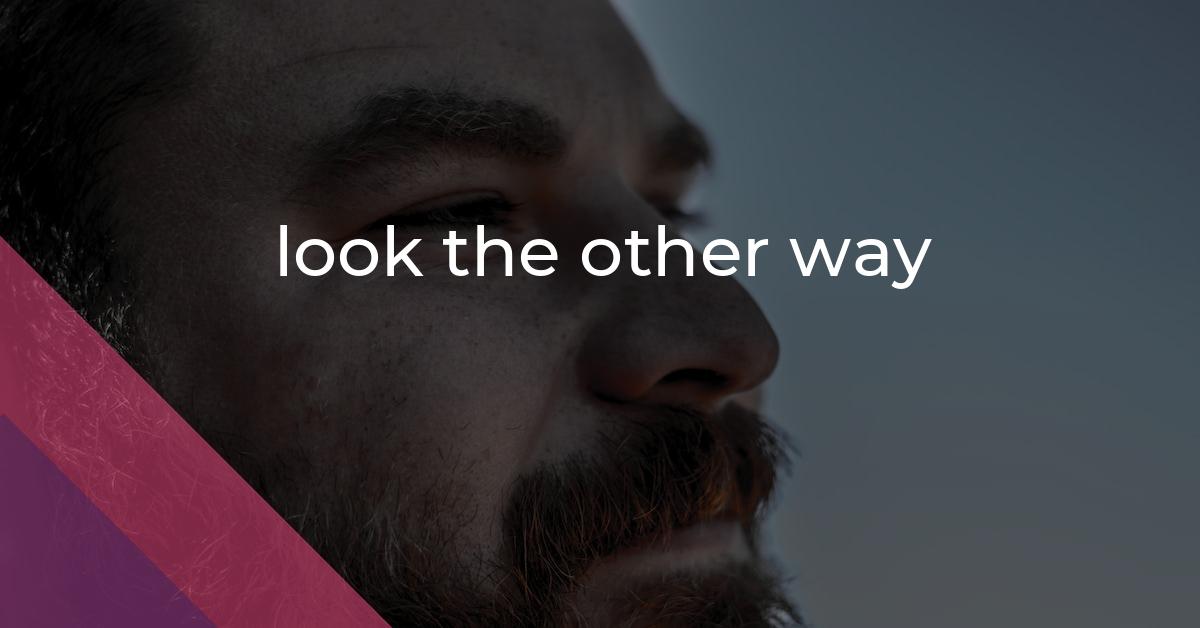look the other way: Idiom Meaning and Origin
What does ‘look the other way’ mean?
The idiom "look the other way" means to purposefully ignore or pretend not to notice something that is wrong or improper. It is often used when someone wants to avoid taking action or becoming involved in a potentially difficult or uncomfortable situation.

Idiom Explorer
The idiom "put one's head in the sand" means to ignore or avoid reality or a problem, refusing to acknowledge it or take action. It is often used to describe someone who is in denial or unwilling to face the truth.
The idiom "play possum" means to pretend to be dead or unconscious in order to avoid a dangerous or uncomfortable situation.
The idiom "play along" means to pretend to agree or go along with something, usually for the sake of keeping the peace or avoiding conflict.
The idiom "pass the buck" means to shift responsibility or blame onto someone else.
The idiom "parade passed someone by" means that someone has missed out on an opportunity or event, usually because they were not paying attention or were not involved. It suggests that the person has been left behind or is out of touch with what is happening around them.
The idiom "out of someone's way" means to move or step aside in order to not impede or obstruct someone or something. It implies giving space or allowing someone to proceed without hindrance or interference.
The idiom "out of sight, out of mind" means that when something or someone is not visible or present, people tend to forget about it or them.
The idiom "other side" refers to a different perspective, viewpoint, or position on a particular matter or issue. It implies considering alternate opinions or taking into account different aspects of a situation.
The idiom "on the outside, looking in" means to be excluded or feel excluded from a group or activity, typically observing it from a distance and feeling a sense of isolation or being left out.
The Art of Disregard
The idiom "look the other way" is a commonly used phrase in the English language. It is often used figuratively to describe intentionally ignoring or avoiding a situation or problem. This idiom has its origins in the physical action of turning one's head to face a different direction. The word "look" refers to directing one's gaze, while "the other way" indicates a different direction.
The exact origin of the idiom is unclear, but it is believed to have been in use since at least the early 19th century. It likely emerged from our instinctive reflex to avert our gaze when faced with something unpleasant or uncomfortable.
The idiom is often used when someone deliberately chooses not to acknowledge or address a situation they are aware of. This may be due to fear, indifference, or a desire to avoid confrontation or responsibility. It can also describe turning a blind eye to unethical or illegal behavior.
In some cases, this idiom can describe a necessary act of self-preservation or the importance of prioritizing one's well-being. However, it often carries a negative connotation.
Another idiom related to "look the other way" is "look on". "Look on" is used to express observing something from a certain perspective or viewpoint. It can be used to describe taking a passive stance on a situation, similar to "looking the other way". For example, someone might "look on" while others engage in a heated debate without actively participating.
A related idiom is "look off". "Look off" means to divert or avert one's gaze, similar to "look the other way". This idiom is often used to describe intentionally ignoring something, just like "look the other way". For instance, a person may "look off" when confronted with a distressing image or situation, choosing not to engage with it.
Another idiom is "look out". "Look out" is used to express the act of being vigilant or aware of potential dangers or problems. It can be used similarly to "look the other way" when someone fails to pay attention to a situation that requires caution. For example, if someone warns you to "look out" for oncoming traffic and you ignore their advice, you may be "looking the other way".
Another related idiom is "look over one's shoulder". "Look over one's shoulder" means to constantly be vigilant or suspicious, often due to a perceived threat. This idiom can be used alongside "look the other way" when someone is ignoring a problem or danger while also constantly checking for any potential negative consequences. For example, a person might "look over their shoulder" while engaging in risky behavior, choosing to "look the other way" regarding the potential consequences.
One last related idiom is "out of sight, out of mind". This idiom suggests that when something or someone is not within sight, they are easily forgotten or neglected. It is similar to "look the other way" in the sense that both expressions can describe intentionally ignoring or avoiding something. For example, if someone asks about a problem you don't want to deal with, you might respond with "out of sight, out of mind", indicating that you choose to ignore it or pretend it doesn't exist.
The idiom "look the other way" is a well-established and widely used phrase in the English language. It captures the concept of intentionally ignoring or avoiding a particular situation or problem, often for personal reasons. Whether it is used to describe an individual's choice to ignore wrongdoing or a collective societal response, this idiom serves as a reminder of our inclination to turn a blind eye and the repercussions that may follow.
Example usage
Examples of how the idiom "look the other way" can be used in a sentence:
- When the boss caught his employee stealing, he decided to look the other way and not report the incident.
- Despite witnessing her friend cheating during the exam, she chose to look the other way and didn't reveal what she saw.
- Instead of confronting his neighbor about the loud parties, he preferred to look the other way and tolerate the noise.
The idiom "look the other way" is used to describe a situation where someone deliberately ignores or avoids noticing something inappropriate, wrong, or illegal that is happening. It implies turning a blind eye or pretending not to see or acknowledge the issue at hand.
More "Neglect" idioms



